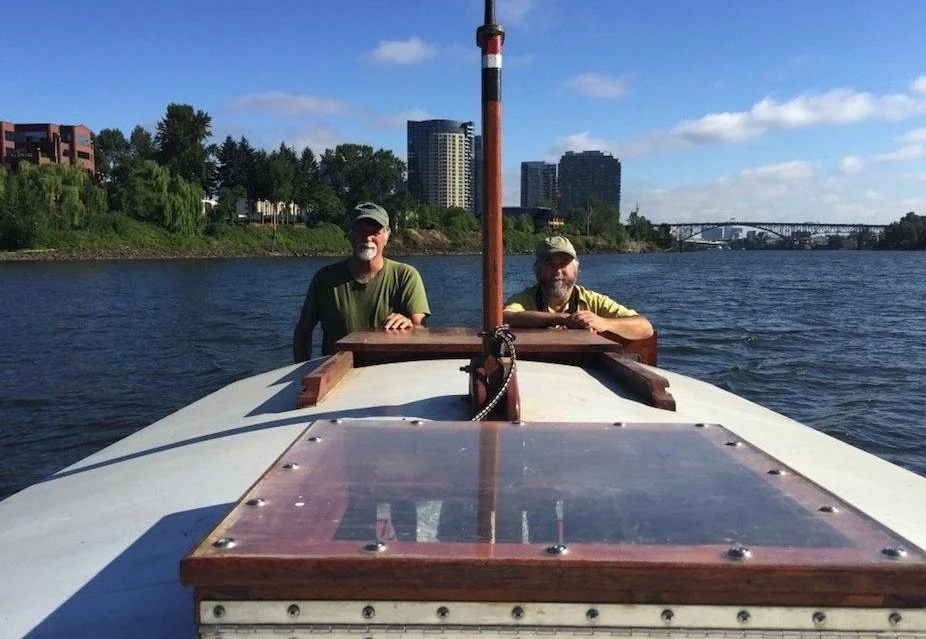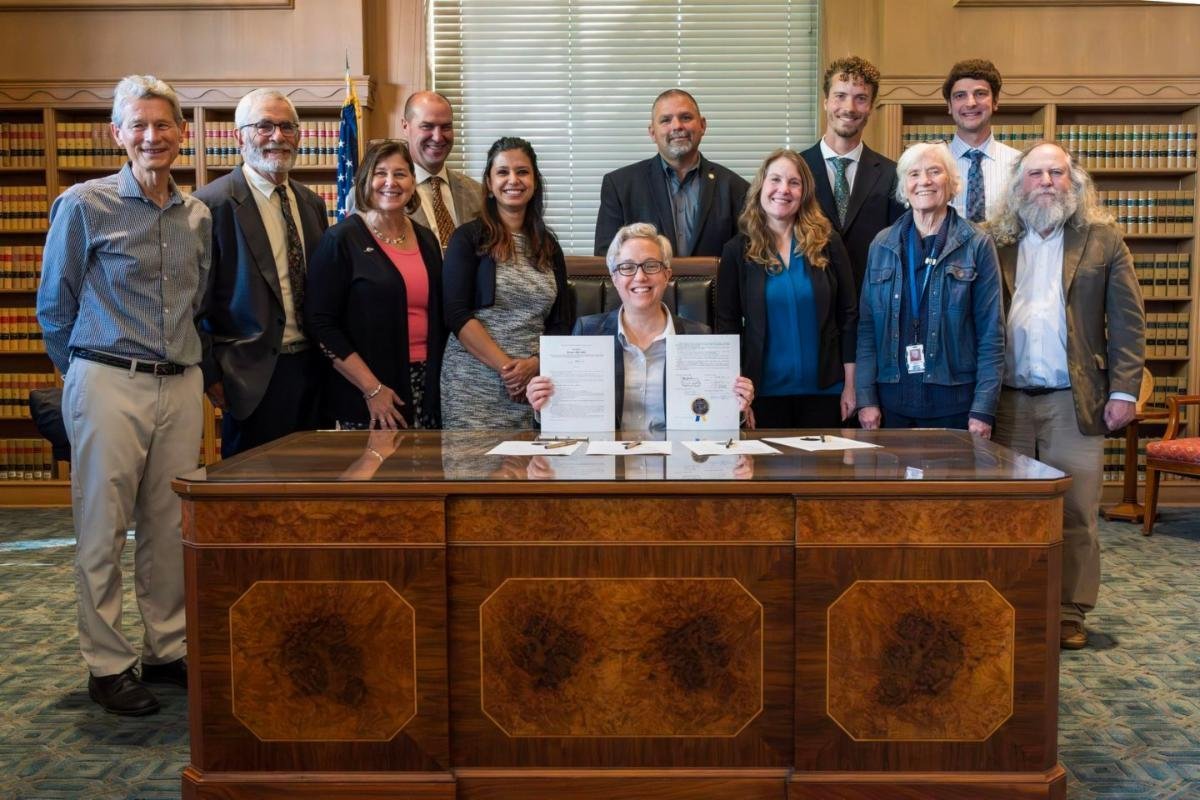a tribute to willamette riverkeeper’s urban conservation and executive director, bob sallinger
~ as told by wrk staff and friend, mike houck
Willamette Riverkeeper is deeply saddened by the unexpected passing of our Executive Director, Bob Sallinger, on Wednesday, October 30, 2024.
Bob joined Willamette Riverkeeper in 2023 as our Urban Conservation Director, and his commitment quickly extended across every facet of our organization as he took the helm in June 2024 as our Executive Director. His leadership and vision were instrumental in advancing our mission to protect and restore the Willamette River and its ecosystems. Bob achieved numerous milestones during his tenure with us that will continue to shape our work and legacy.
Among his significant accomplishments:
Bob was a driving force behind the passage of Oregon’s Beaver Bill (HB 3464), which reclassified beavers from "predator" to "furbearer" status on private lands. His advocacy helped secure protections for this keystone species, furthering ecological resilience in Oregon’s private forests.
He was instrumental in advocating for the passage of a wake boat bill, which aimed to limit wake boat activity in sensitive areas of the Willamette River, reducing erosion and habitat disruption to protect riverbank ecosystems and improve water quality.
He played a key role in amending and influencing housing policy, specifically helping to defeat the governor’s original housing bill, HB 3414. Bob highlighted critical concerns about deforestation, floodplain development, and the need for genuine accountability in affordable housing, ultimately shaping more sustainable housing legislation in 2024.
Bob was a steadfast advocate for Oregon’s land-use system, ensuring that new housing developments balanced growth with stringent environmental protections and sustainable land management.
He led our campaign urging the Ross Island Sand and Gravel Company to address unresolved legal obligations, fulfill restoration requirements, and transfer Ross Island into public ownership, advocating for long-term public access and environmental stewardship.
Our own Bob Sallinger, first row, first person from the right, led the legislative changes to the Beaver Bill, signed into legislation on September 28, 2023, joining Governor Kotek, and many other advocates aiding in the protection of beavers as a keystone species for the health of Oregon’s riparian forests and fish habitats.
Bob’s dedication extended beyond individual projects—he was deeply committed to ensuring that environmental protections remained strong across Oregon’s landscapes and waterways. We honor his incredible contributions and will continue to carry forward his unwavering commitment to protecting and conserving river habitats and water quality throughout the Willamette watershed. His spirit will remain a guiding force in our work and our mission.
Bob, second row, second from right, always made time to squeeze in on-the-ground adventures with staff in order to better understand what WRK was accomplishing in the field. Through his participation in our work, Bob fostered a sense of respect and apprection with WRK’s staff, partners, and our volunteers. He was also one of our most enthusiastic participants in battling invasive aquatic weeds side by side with volunteers at this recent Paddle & Pull event.
Deputy Director, Michelle Emmons, and Bob Sallinger, during a recent trip to WRK’s Nichols Sanctuary for a Night Skies Tour “test run”, hoping to bring this event to our constituents in 2025.
in their own words… wrk staff remember bob:
“One of my greatest memories with Bob was paddling a tandem with him on the Willamette during our last Paddle & Pull event. In his new role he wanted to make sure he knew more about the work I do and experience it. His pur joy and eagerness to learn more about my program was genuine and heartfelt. I taught him about plants, and he threw out bird facts… we had a wonderful time ‘nerding out’ together!
”
“Bob was a good man, a great boss, and an incredible advocate. The work he did and the impact he made will be felt around the state for generations to come, he will be deeply missed.
”
“Bob was my advocacy hero, mentor, and most importantly, my kindred friend. I ‘got’ Bob - as a fellow entrepreneurial spirit driven by our mutual levels of ambition and commitment to leave the world a better place. Bob’s ethic (and musical lyric references) will continue to guide me in efforts of collaboration, partnership, and teamwork as the core of my professional future.”
Bob Sallinger in his element, photographing birds from the bow of a canoe on a recent WRK river trip.
Based on their more than thirty-year friendship and many collaborations on issues related to the Willamette River, we invited Mike Houck, Director of the Urban Greenspaces Institute to recount their many adventures in tribute to Bob’s work for Willamette Riverkeeper and the many partners he brought into those conservation efforts.
a tribute to bob sallinger by mike houck
When Bob informed me he that had accepted the position as Conservation Director at Willamette Riverkeeper I was elated, given Bob’s history and expertise regarding urban conservation in the Portland region. I will admit I had trepidation when Bob later accepted the position of Executive Director. I knew that would mean he would have less time for his conservation work, but I also knew Willamette Riverkeeper needed his leadership. Bob was dedicated to Willamette Riverkeeper’s future, to the Willamette River, and to conservation across the state, including his work in Malheur, the Klamath and the Elliott State Forest.
Many years ago, Bob and I met with Robert Pamplin, Jr. to press him on his promise to donate Ross Island to the city of Portland, a promise he made to former Mayor Vera Katz. Bob was at his absolute best in confronting Mr. Pamplin on his having reneged on his promised donation. I remember him looking Mr. Pamplin in the eye, challenging him to make good on his promise. I credit Bob with closing the deal which led to the donation of over 50 acres of Ross Island to Portland Parks and Recreation.
Two days before his death I was present when Bob addressed an audience of agencies, nonprofits and health advocates concerning toxic algal blooms emanating from the Ross Island Lagoon.
Two days before his death I was present when Bob addressed an audience of agencies, nonprofits and health advocates concerning toxic algal blooms emanating from the Ross Island Lagoon.
He brought his science background and many years of working on the Willamette River to persuasively argue that any effort to address algal blooms must be holistic and address the ecological health of the four-island archipelago. His presentation will be crucial to ensuring whatever solution is adopted will durably protect the whole island complex in the face of climate change.
When you walk the Willamette River Greenway at South waterfront you should appreciate the years of advocacy Bob put in on advisory committees, testimony before the city’s land use governing bodies and work with the media. The robust riparian habitat that lines the Willamette River Greenway is there due to Bob’s dedication to ensuring we all have access to nature and the Willamette River’s fish and wildlife habitat was enhanced. Bob went toe-to-toe with those who argued salmon do not use the riverbank during their migration and he won that argument, an argument that later was validated by city and state’s ecologists.
Bob admirably bridged the need to address social and environmental justice issues and fighting for the rights of nature when he argued with great passion that nature should be protected for its intrinsic, inherent value. He was emphatic on the dual conservation ethic for which Riverkeeper can be proud. His work on the Portland Harbor Superfund site advocated for cleanup that would preserve fish and wildlife habitat. To ensure social and environmental justice issues were addressed all his work was in collaboration with underserved and underrepresented communities. He also worked with those communities to promote safe public access at Willamette Cove.
Bob’s contributions to protecting, restoring and managing natural resources of the Willamette River are reflected by the volume and heartfelt tributes from across the region, the state and beyond. One would expect such tributes to come from sister organizations and a grateful public. However, many of his most ardent opponents have also recounted their admiration of Bob’s ability to fight the good fight while being collaborative, ethical and a “man of his word.” Just one example comes from someone who might have good reason to resent Bob’s forceful and ultimately successful efforts to protect West Hayden Island from the Port of Portland’s proposed marine facility. Curtis Robinhold, Port Director recounted in Steve Duin’s Farewell to a Force of Nature, that Bob “was smart. He usually knew more than you did. And he was relentless in getting to the right answer.”
“Willamette Riverkeeper should be proud they were guided by an environmental champion who will, without a doubt, inspire those who join the effort to protect the Willamette River and beyond.”










